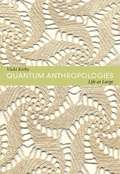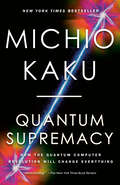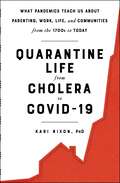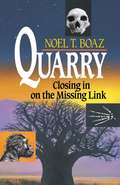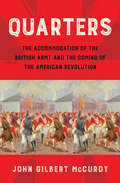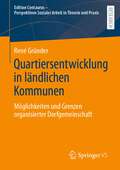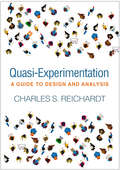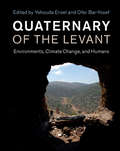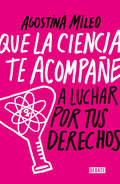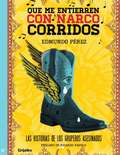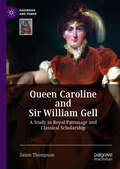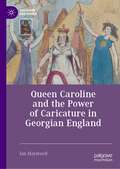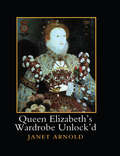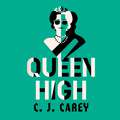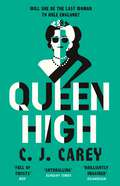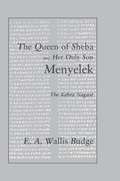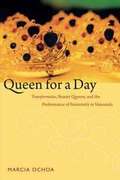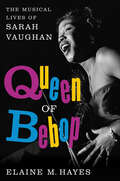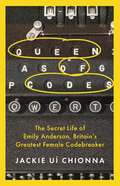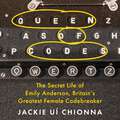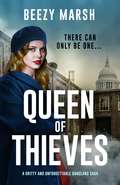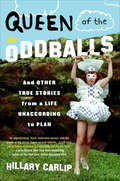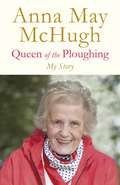- Table View
- List View
Quantum Anthropologies: Life at Large
by Vicki KirbyIn Quantum Anthropologies, the renowned feminist theorist Vicki Kirby contends that some of the most provocative aspects of deconstruction have yet to be explored. Deconstruction's implications have been curtailed by the assumption that issues of textuality and representation are specific to the domain of culture. Revisiting Derrida's claim that there is "no outside of text," Kirby argues that theories of cultural construction developed since the linguistic turn have inadvertently reproduced the very binaries they intended to question, such as those between nature and culture, matter and ideation, and fact and value. Through new readings of Derrida, Husserl, Saussure, Butler, Irigaray, and Merleau-Ponty, Kirby exposes the limitations of theories that regard culture as a second-order system that cannot access--much less be--nature, body, and materiality. She suggests ways of reconceiving language and culture to enable a more materially implicated outcome, one that keeps alive the more counterintuitive and challenging aspects of poststructural criticism. By demonstrating how fields, including cybernetics, biology, forensics, mathematics, and physics, can be conceptualized in deconstructive terms, Kirby fundamentally rethinks deconstruction and its relevance to nature, embodiment, materialism, and science.
Quantum Mind and Social Science
by Alexander WendtThere is an underlying assumption in the social sciences that consciousness and social life are ultimately classical physical/material phenomena. In this ground-breaking book, Alexander Wendt challenges this assumption by proposing that consciousness is, in fact, a macroscopic quantum mechanical phenomenon. In the first half of the book, Wendt justifies the insertion of quantum theory into social scientific debates, introduces social scientists to quantum theory and the philosophical controversy about its interpretation, and then defends the quantum consciousness hypothesis against the orthodox, classical approach to the mind-body problem. In the second half, he develops the implications of this metaphysical perspective for the nature of language and the agent-structure problem in social ontology. Wendt's argument is a revolutionary development which raises fundamental questions about the nature of social life and the work of those who study it.
Quantum Supremacy: How the Quantum Computer Revolution Will Change Everything
by Michio KakuNEW YORK TIMES BESTSELLER • An exhilarating tour of humanity's next great technological achievement—quantum computing—which may supercharge artificial intelligence, solve some of humanity's biggest problems, like global warming, world hunger, and incurable disease, and eventually illuminate the deepest mysteries of science, by the bestselling author of The God Equation. • &“Expertly describes and rectifies common misconceptions about quantum computing." —Science "[Kaku's] lucid prose and thought process make abundant sense of this technological turning point.&” —The New York Times Book ReviewThe runaway success of the microchip may finally be reaching its end. As shrinking transistors approach the size of atoms, the phenomenal growth of computational power inevitably collapses. But this change heralds the birth of a revolutionary new type of computer, one that calculates on atoms themselves.Quantum computers promise unprecedented gains in computing power, enabling advancements that could overturn every aspect of our daily lives. While the media has mainly focused on their startling potential to crack any known encryption method, the race is already on to exploit their incredible power to revolutionize industry. Automotive makers, medical researchers, and consulting firms are all betting on quantum computing to design more efficient vehicles, create life-saving new drugs, and streamline businesses. But this is only the beginning. Quantum computing could be used to decode the complex chemical processes needed to produce cheap fertilizers and unleash a second Green Revolution; create a super battery that will enable the Solar Age; or design nuclear fusion reactors to generate clean, safe, renewable energy. It may even unravel the fiendishly difficult protein folding that lies at the heart of as-yet-incurable diseases like Alzheimer&’s, ALS, and Parkinson&’s. Already, quantum computers are being put to work to help solve the greatest mystery in science—the origin of the universe.There is no single problem humanity faces that might not be addressed by quantum computers. With his signature clarity and enthusiasm, Dr. Michio Kaku, who has spent his entire professional life working on the quantum theory, tells the thrilling story of this exciting scientific frontier and the race to claim humanity&’s future.
Quarantine Life from Cholera to COVID-19: What Pandemics Teach Us About Parenting, Work, Life, and Communities from the 1700s to Today
by Kari NixonFor readers of Mary Roach and Adam Diamond, an innovative look at the histories of different epidemics and what it meant for society, alongside what lessons different diseases have to teach us as society battles the novel Coronavirus.Throughout history, there have been numerous epidemics that have threatened mankind with destruction. Diseases have the ability to highlight our shared concerns across the ages, affecting every social divide from national boundaries, economic categories, racial divisions, and beyond. Whether looking at smallpox, HIV, Ebola, or COVID-19 outbreaks, we see the same conversations arising as society struggles with the all-encompassing question: What do we do now? Quarantine Life from Cholera to COVID-19 demonstrates that these conversations have always involved the same questions of individual liberties versus the common good, debates about rushing new and untested treatments, considerations of whether quarantines are effective to begin with, what to do about healthy carriers, and how to keep trade circulating when society shuts down. This immensely readable social and medical history tracks different diseases and outlines their trajectory, what they meant for society, and societal questions each disease brought up, along with practical takeaways we can apply to current and future pandemics—so we can all be better prepared for whatever life throws our way.
Quarry Closing In On the Missing Link
by Noel T. BoazA leading anthropologist's twenty-year quest in northern and eastern Africa shows how findings from a variety of fields contribute to a holistic picture of human evolution and provide a context for understanding today's problems.
Quarters: The Accommodation of the British Army and the Coming of the American Revolution
by John Gilbert McCurdyWhen Americans declared independence in 1776, they cited King George III "for quartering large bodies of armed troops among us." In Quarters, John Gilbert McCurdy explores the social and political history behind the charge, offering an authoritative account of the housing of British soldiers in America. Providing new interpretations and analysis of the Quartering Act of 1765, McCurdy sheds light on a misunderstood aspect of the American Revolution. Quarters unearths the vivid debate in eighteenth-century America over the meaning of place. It asks why the previously uncontroversial act of accommodating soldiers in one's house became an unconstitutional act. In so doing, Quarters reveals new dimensions of the origins of Americans' right to privacy. It also traces the transformation of military geography in the lead up to independence, asking how barracks changed cities and how attempts to reorder the empire and the borderland led the colonists to imagine a new nation.Quarters emphatically refutes the idea that the Quartering Act forced British soldiers in colonial houses, demonstrates the effectiveness of the Quartering Act at generating revenue, and examines aspects of the law long ignored, such as its application in the backcountry and its role in shaping Canadian provinces.Above all, Quarters argues that the lessons of accommodating British troops outlasted the Revolutionary War, profoundly affecting American notions of place. McCurdy shows that the Quartering Act had significant ramifications, codified in the Third Amendment, for contemporary ideas of the home as a place of domestic privacy, the city as a place without troops, and a nation with a civilian-led military.
Quartiersentwicklung in ländlichen Kommunen: Möglichkeiten und Grenzen organisierter Dorfgemeinschaft (Edition Centaurus - Perspektiven Sozialer Arbeit in Theorie und Praxis)
by René GründerDas Konzept der Quartiersentwicklung entstand in einem großstädtischen Kontext. Mit der Annäherung der Lebenswelten von Menschen in städtischen und ländlichen Kommunen, wird diese sozialräumliche Strategie aber auch für kleinere Städte und Gemeinden interessant. Was bei der Übertragung von Quartiersentwicklungsansätzen auf die Besonderheiten des ländlichen Raumes zu bedenken ist und welche Chancen sowie Herausforderungen dies für die Gestaltung zukunftsfähiger Dorfgemeinschaften bedeutet, wird in diesem Buch auf Grundlage von Theorie und Forschungsergebnissen praxisbezogen dargestellt.
Quasi-Experimentation: A Guide to Design and Analysis (Methodology in the Social Sciences)
by Charles S. ReichardtFeaturing engaging examples from diverse disciplines, this book explains how to use modern approaches to quasi-experimentation to derive credible estimates of treatment effects under the demanding constraints of field settings. Foremost expert Charles S. Reichardt provides an in-depth examination of the design and statistical analysis of pretest–posttest, nonequivalent groups, regression discontinuity, and interrupted time-series designs. He details their relative strengths and weaknesses and offers practical advice about their use. Comparing quasi-experiments to randomized experiments, Reichardt discusses when and why the former might be a better choice than the latter in the face of the contingencies that are likely to arise in practice. Modern methods for elaborating a research design to remove bias from estimates of treatment effects are described, as are tactics for dealing with missing data and noncompliance with treatment assignment. Throughout, mathematical equations are translated into words to enhance accessibility. Adding to its discussion of prototypical quasi-experiments, the book also provides a complete typology of quasi-experimental design options to help the reader craft the best research design to fit the circumstances of a given study.
Quaternary of South America and Antarctic Peninsula 1983
by Jorge RabassaThis book focuses on the problems of the Quaternary in South America and Antarctic Peninsula, with a strong emphasis in the paleoenvironmental and paleoclimatic approach. It is based on contributions presented at the South American Regional Meeting held in Neuquen, Argentina.
Quaternary of the Levant: Environments, Climate Change, and Humans
by Yehouda Enzel Bar-Yosef OferQuaternary of the Levant presents up-to-date research achievements from a region that displays unique interactions between the climate, the environment and human evolution. Focusing on southeast Turkey, Lebanon, Syria, Jordan and Israel, it brings together over eighty contributions from leading researchers to review 2. 5 million years of environmental change and human cultural evolution. Information from prehistoric sites and palaeoanthropological studies contributing to our understanding of 'out of Africa' migrations, Neanderthals, cultures of modern humans, and the origins of agriculture are assessed within the context of glacial-interglacial cycles, marine isotope cycles, plate tectonics, geochronology, geomorphology, palaeoecology and genetics. Complemented by overview summaries that draw together the findings of each chapter, the resulting coverage is wide-ranging and cohesive. The cross-disciplinary nature of the volume makes it an invaluable resource for academics and advanced students of Quaternary science and human prehistory, as well as being an important reference for archaeologists working in the region.
Que la ciencia te acompañe: A luchar por tus derechos
by Agostina MileoDatos científicos de los temas clave en la agenda de género para sostener la crítica feminista. Aunque la humanidad no está formada solo por varones blancos heterosexuales, ellos son el modelo con que el mundo todo se organiza y se piensa. El sexo, la economía, la salud, la tecnología, incluso la ciencia -amparada por una supuesta neutralidad y objetividad-, refuerza estereotipos patriarcales que pasan desapercibidos la mayoría de las veces. Por suerte, Agostina Mileo confronta con sensatez los prejuicios y desarma con lenguaje claro e información accesible, cada uno de los lugares comunes en los que se arraiga el machismo, abriendo la discusión sobre temas como la "utilidad" de los orgasmos, las diferencias entre el cerebro "femenino" o "masculino" (¿y trans?), las falacias sobre el aborto y los mitos de la menstruación. Con irreverencia, demuestra por qué es imperioso construir una mirada crítica y diversa sobre la producción y comunicación del conocimiento, y cuestionar nuestras propias opiniones una y otra vez. En la lucha por una sociedad igualitaria, necesitamos que también ¡la ciencia nos acompañe!
Que me entierren con narcocorridos
by Edmundo PérezEste libro nos cuenta la historia de la música y cultura que idolotra al narco, así como las vidas trágicas de quienes se atreven a ser sus interpretes. Muertes, desapariciones, tiroteos, miedo, odio, saña. Todo eso arrastra hoy a la sociedad mexicana por una decisión desatinada del poder, y no es para menos; lo cierto es que no existe ningún rincón del país libre de tensiones ni de violencia. Todo ello viene a cuento a propósito del libro Que me entierren con narcocorridos, del colega periodista Edmundo Pérez, en el que se documenta la barbarie -no se le puede llamar de otra manera- de violencia y muerte que enfrentan algunos actores del espectáculo, cantantes y gruperos de México. En éstas y en el resto de las historias que nos cuenta Edmundo Pérez hay emociones encontradas, tristeza y enojo al mismo tiempo. Quizá estas muertes nunca se aclaren, por eso cobra valía el trabajo periodístico de mi colega, quien con su esfuerzo nos sacude el interior y nos dice a la sociedad que no permitamos caer en la desmemoria. RICARDO RAVELO
Queen Caroline and Sir William Gell: A Study in Royal Patronage and Classical Scholarship (Queenship and Power)
by Jason ThompsonThis book explores the relationship between Queen Caroline, one of the most enigmatic characters in Regency England, and Sir William Gell, the leading classical scholar of his day. Despised and rejected by her husband, Caroline created a sphere and court of her own through patronage of scholarship. The primary beneficiary was Gell, a pioneering scholar of the classical world who opened new dimensions in the study of ancient Troy, mainland Greece, and Ithaca. Despite his achievements, Gell had scarce financial resources. Support from Caroline enabled him to establish himself in Italy and conduct his seminal work about ancient Rome and, especially, Pompeii, until her sensational trial before the House of Lords and premature death. Concluding with the first scholarly transcription of the extraordinary series of letters that Caroline wrote to Gell, this volume illuminates how Caroline sought power through patronage, and how Gell shaped classical scholarship in nineteenth-century Britain.
Queen Caroline and the Power of Caricature in Georgian England (Queenship and Power)
by Ian HaywoodThis book will be the first dedicated study of the remarkable role of Georgian caricature in the equally remarkable Queen Caroline controversy of 1820-21. When the newly crowned George IV, formerly the Prince of Wales, refused to recognise his estranged wife Caroline as the rightful queen of the Britain, her refusal to rescind her claim to the throne provoked a huge campaign of sympathy and support that almost toppled the government. The British people rallied round the ‘injured’ queen in their hundreds of thousands, and massed rallies, processions, protests and petitioning became daily news.The Queen Caroline controversy was the zenith of the ‘Golden Age’ of caricature, a tour-de-force of imagination, wit, inventiveness and sheer political mischief. In image after image, Caroline triumphs over her cowardly and conniving enemies, subverting gender and political hierarchies, and giving a presence and voice to her unenfranchised followers. This book therefore aims to chronicle and analyse this achievement.
Queen Elizabeth's Wardrobe Unlock'd
by Janet ArnoldThis book provides photographs of portraits, miniatures, tomb sculptures, engravings, woven textiles and embroideries of clothes found in the wardrobe of Queen Elizabeth. It is an invaluable reference for students of the history of dress and embroidery, for social historians and art historians.
Queen High: The brilliant sequel to Widowland
by C J CareyThe thrilling sequel to Widowland, 'Clever, thrilling, brilliantly imagined ... chillingly convincing post-war dystopia' (Clare Chambers). Perfect for fans of Fatherland and The Handmaid's Tale.June, 1956The Leader has been dead for three years. His assassination, on British soil, provoked violent retribution and intensified repression of British citizens, particularly women. Now, more than ever, the Protectorate is a place of surveillance and isolation - a land of spies.Every evening Rose Ransom looks in the mirror and marvels that she's even alive. A mere woman, her role in the Leader's death has been miraculously overlooked. She still works at the Culture Ministry, where her work now focuses on the outlawed subject of Poetry, a form of writing that transmits subversive meanings, emotions and signals that cannot be controlled. Therefore all Poetry is banned and Rose is appointed a Poet Hunter.To widespread surprise, President Eisenhower is to make a state visit to the Alliance and Rose is tasked with visiting the widowed Queen Wallis to provide a background briefing. When she arrives at the palace, she finds Wallis in a state of paranoia, desperate to return to America and enjoy the liberty of her homeland. She claims she has a secret document so explosive that it will blow the Protectorate apart - but will the last Queen of England pull the trigger on the Alliance?(P) 2022 Quercus Editions Limited
Queen High: Thrilling dystopian fiction from the acclaimed author of WIDOWLAND
by C J CareyThrilling dystopian fiction from the acclaimed author of Widowland, 'Clever, thrilling, brilliantly imagined ... chillingly convincing post-war dystopia' (Clare Chambers). Perfect for fans of Fatherland and The Handmaid's Tale.Britain, with the wrong queen.1955. The Leader has been dead for two years. His assassination, on British soil, provoked violent retribution and intensified repression of British citizens, particularly women. Now, more than ever, the Protectorate is a place of surveillance and isolation - a land of spies.The royal family has been usurped, and the widowed Queen Wallis reigns in their place. Yet still some citizens hold out hope that Elizabeth may one day return.Every evening Rose Ransom looks in the mirror and marvels that she's even alive. A mere woman, her role in the Leader's death has been miraculously overlooked. She still works at the Culture Ministry, where her work now focuses on the outlawed subject of Poetry, a form of writing that transmits subversive meanings, emotions and signals that cannot be controlled. Therefore all Poetry is banned and Rose is appointed a Poet Hunter.To widespread surprise, President Eisenhower is to make a state visit to the Alliance and Rose is tasked with visiting the widowed Wallis to provide a background briefing. When she arrives at the palace, she finds Wallis in a state of paranoia, desperate to return to America and enjoy the liberty of her homeland. She claims she has a secret document so explosive that it will blow the Protectorate apart - but will she dare to pull the trigger on the Alliance?PRAISE FOR QUEEN HIGH 'Begins with a bang' CLARE CHAMBERS'Full of twists' RED'A gripping thriller' BEL MOONEY'Exciting and provocative' OBSERVER'Thrilling, subversive' JANE HARRIS 'A triumph' AMANDA CRAIG'Enthralling' THE SUNDAY TIMES'Ingenious' SABINE DURRANT
Queen Of Sheba: The Kebra Nagast
by BudgeFirst published in 2001. Routledge is an imprint of Taylor & Francis, an informa company.
Queen for a Day: Transformistas, Beauty Queens, and the Performance of Femininity in Venezuela
by Marcia OchoaQueen for a Day connects the logic of Venezuelan modernity with the production of a national femininity. In this ethnography, Marcia Ochoa considers how femininities are produced, performed, and consumed in the mass-media spectacles of international beauty pageants, on the runways of the Miss Venezuela contest, on the well-traveled Caracas avenue where transgender women (transformistas) project themselves into the urban imaginary, and on the bodies of both transformistas and beauty pageant contestants (misses). Placing transformistas and misses in the same analytic frame enables Ochoa to delve deeply into complex questions of media and spectacle, gender and sexuality, race and class, and self-fashioning and identity in Venezuela.Beauty pageants play an outsized role in Venezuela. The country has won more international beauty contests than any other. The femininity performed by Venezuelan women in high-profile, widely viewed pageants defines a kind of national femininity. Ochoa argues that as transformistas and misses work to achieve the bodies, clothing and makeup styles, and postures and gestures of this national femininity, they come to embody Venezuelan modernity.
Queen of Bebop: The Musical Lives of Sarah Vaughan
by Elaine M. HayesPublishers Weekly Best Book of 2017Washington Post Best Book of 2017Amazon Editors' Top 100 Pick of the YearAmazon Best Humor and Entertainment Pick of the YearBooklist Top Ten Arts BookQueen of Bebop brilliantly chronicles the life of jazz singer Sarah Vaughan, one of the most influential and innovative musicians of the twentieth century and a pioneer of women’s and civil rightsSarah Vaughan, a pivotal figure in the formation of bebop, influenced a broad array of singers who followed in her wake, yet the breadth and depth of her impact—not just as an artist, but also as an African-American woman—remain overlooked. Drawing from a wealth of sources as well as on exclusive interviews with Vaughan’s friends and former colleagues, Queen of Bebop unravels the many myths and misunderstandings that have surrounded Vaughan while offering insights into this notoriously private woman, her creative process, and, ultimately, her genius. Hayes deftly traces the influence that Vaughan’s singing had on the perception and appreciation of vocalists—not to mention women—in jazz. She reveals how, in the late 1940s and early 1950s, Vaughan helped desegregate American airwaves, opening doors for future African-American artists seeking mainstream success, while also setting the stage for the civil rights activism of the 1960s and 1970s. She follows Vaughan from her hometown of Newark, New Jersey, and her first performances at the Apollo, to the Waldorf Astoria and on to the world stage, breathing life into a thrilling time in American music nearly lost to us today.Equal parts biography, criticism, and good old-fashioned American success story, Queen of Bebop is the definitive biography of a hugely influential artist. This absorbing and sensitive treatment of a singular personality updates and corrects the historical record on Vaughan and elevates her status as a jazz great.
Queen of Codes: The Secret Life of Emily Anderson, Britain's Greatest Female Code Breaker
by Dr Jackie Ui ChionnaWhen the history of British codebreaking is told, the story is often a men-only preserve (for example, of the top fourteen listed actors in Bletchley Park-set The Imitation Game, only one is a woman). That perception completely ignores the fact that the vast majority of codebreakers were in fact women. And foremost among them was one who is largely unknown to the public, and whose activities were a secret even to her closest contacts - Emily Anderson. Anderson was a leading member of British intelligence for over three decades. She played key roles in both World Wars, worked in Bletchley Park and in the Middle East, and was reckoned among the top three female codebreakers in the world. Her work coincided with her other great love - music. She is famous in musicology circles as being the first to effectively decipher the letters and diaries of Mozart and Beethoven. In 1961 Germany awarded her their highest honour, the Order of Merit First Class, completely ignorant of the fact that the interpretative skills they were honouring were the same utilised to defeat their military only a few years previously. Secrecy was the keyword of her life, as she also had affairs with other women at a time when such was not generally accepted. That few are familiar with her name is no surprise. Even those close to her had little idea that she had such a significant role in international affairs. Now, this startling new narrative of her life, complete with new material and sources The Queen of Codes will place Emily Anderson at the forefront of great British codebreakers.
Queen of Codes: The Secret Life of Emily Anderson, Britain's Greatest Female Code Breaker
by Dr Jackie Ui ChionnaWhen the history of British codebreaking is told, the story is often a men-only preserve (for example, of the top fourteen listed actors in Bletchley Park-set The Imitation Game, only one is a woman). That perception completely ignores the fact that the vast majority of codebreakers were in fact women. And foremost among them was one who is largely unknown to the public, and whose activities were a secret even to her closest contacts - Emily Anderson. Anderson was a leading member of British intelligence for over three decades. She played key roles in both World Wars, worked in Bletchley Park and in the Middle East, and was reckoned among the top three female codebreakers in the world. Her work coincided with her other great love - music. She is famous in musicology circles as being the first to effectively decipher the letters and diaries of Mozart and Beethoven. In 1961 Germany awarded her their highest honour, the Order of Merit First Class, completely ignorant of the fact that the interpretative skills they were honouring were the same utilised to defeat their military only a few years previously. Secrecy was the keyword of her life, as she also had numerous relationships with other women at a time when such was not generally accepted. That few are familiar with her name is no surprise. Even those close to her had little idea that she had such a significant role in international affairs. Now, this startling new narrative of her life, complete with new material and sources The Queen of Codes will place Emily Anderson at the forefront of great British codebreakers.(P) 2023 Headline Publishing Group Ltd
Queen of Thieves: An unforgettable new voice in gangland crime saga
by Beezy MarshGangland was a man's world - but the women knew differentLondon, 1946. Alice Diamond, the Queen of the Forty Thieves, rules over her gang of hoisters with a bejewelled fist. Nell is a slum girl from Waterloo, hiding a secret pregnancy and facing a desperately uncertain future. Sensing an opportunity to exploit Nell's vulnerabilities, Alice takes her under her wing and, before long, Nell is experiencing the secret world of hoisting, with all the dangers - and glamorous trappings - that comes with this underworld existence. Alice has a longstanding feud with Billy Sullivan's all-male gang in Soho, and thinks Nell could be a useful weapon in her vendetta. But Nell has a secret agenda of her own, and is not to be underestimated. And the more she is exploited by both Alice and Billy, the more her hunger for revenge grows. As she embraces the seedy underbelly of London, will she prevail in carving out her own path to power and riches... ...and crown herself the Queen of Thieves?From Sunday Times bestselling author Beezy Marsh comes a thrilling new crime saga series, perfect for fans of Sam Michaels, Martina Cole and Jessie Keane. Readers are loving Queen of Thieves 'Gangland at its best''Oooh this book was so good...I am hooked now and can't wait to see how this series develops''This is a proper bang on London saga and I loved the characters...The author is spot on with all her research that makes this book such a unique read''WOW totally pulled into the storyline from the start... it's a real page turner I devoured in one sitting'
Queen of the Oddballs: And Other True Stories from a Life Unaccording to Plan
by Hillary CarlipA hilariously offbeat memoir about an adventurous young woman's escapades as she defies conventions and transforms an ordinary Los Angeles life into a star-studded, extraordinary miracle of self-discovery.Queen of the Oddballs forms a chronology of Hillary Carlip's habitual straying from roads more traveled -- from a wisecracking third-grader suspended from school for smoking (while imitating Holly Golightly) to a headline-making teen activist, juggler and fire eater, friend (NOT "fan") of Carly Simon and Carole King, grand prize-winning Gong Show contestant, cult rock star, and seeker of spiritual and romantic truths that definitely defy expectations.Illustrated with ephemera -- from diary entries and photographs to a handwritten letter from Carly Simon -- Queen of the Oddballs presents a virtual time capsule of pop culture's last four decades and celebrates a creative life lived to the hilt.
Queen of the Ploughing
by Anna May McHugh'The embodiment of the spirit of rural Ireland'Anna May McHugh's name is synonymous with 'the Ploughing' - the annual Championships of the National Ploughing Association. The event is the biggest outdoor agricultural show in Europe and Anna May is the driving force behind its spectacular growth.Anna May now tells her story. Her description of growing up as part of a large family in rural County Laois is an evocative and affectionate account of an Ireland that is now gone. But in her account of how she went from being a secretary of the Ploughing Association, her first job, to becoming - to her own amazement - its managing director twenty years later is a story of leadership and people skills that are very much of the twenty-first century. Anna May was truly ahead of her time.Still living in County Laois, close to where she grew up, and now in her eighties, Anna May still runs the multi-million euro operation from her home, alongside her daughter, Anna Marie. Queen of the Ploughing is a captivating read, full of warmth, lively stories and Anna May's sharp observations. And it's not just about Anna May's life, but is also a celebration of the best of Irish life over eight decades.
